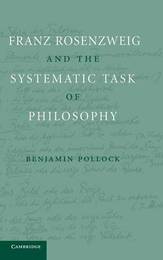
|
Franz Rosenzweig and the Systematic Task of Philosophy
Hardback
Main Details
| Title |
Franz Rosenzweig and the Systematic Task of Philosophy
|
| Authors and Contributors |
By (author) Benjamin Pollock
|
| Physical Properties |
| Format:Hardback | | Pages:354 | | Dimensions(mm): Height 229,Width 152 |
|
| Category/Genre | Judaism
Judaism - mysticism |
|---|
| ISBN/Barcode |
9780521517096
|
| Classifications | Dewey:181.06 |
|---|
| Audience | | Professional & Vocational | |
|---|
|
Publishing Details |
| Publisher |
Cambridge University Press
|
| Imprint |
Cambridge University Press
|
| Publication Date |
23 March 2009 |
| Publication Country |
United Kingdom
|
Description
Benjamin Pollock argues that Franz Rosenzweig's The Star of Redemption is devoted to a singularly ambitious philosophical task: grasping 'the All' - the whole of what is - in the form of a system. In asserting Rosenzweig's abiding commitment to a systematic conception of philosophy, this book breaks rank with the assumptions about Rosenzweig's thought that have dominated recent scholarship. Indeed, the Star's importance is often claimed to lie precisely in the way it opposes philosophy's traditional drive for systematic knowledge and upholds instead a 'new thinking' attentive to the existential concerns, the alterity, and even the revelatory dimension of concrete human life. Pollock shows that these very innovations in Rosenzweig's thought are in fact to be understood as part and parcel of the Star's systematic program. But this is only the case, Pollock claims, because Rosenzweig approaches philosophy's traditional task of system in a radically original manner.
Author Biography
Benjamin Pollock is Assistant Professor of Religious Studies at Michigan State University. He is author of articles in the philosophy of religion and in modern Jewish philosophy appearing in AJS Review, Jewish Studies Quarterly, and other leading journals, and he is co-editor with Michael Morgan of The Philosopher as Witness: Fackenheim and Responses to the Holocaust.
Reviews"The book is a must-read for anybody with a serious interest in modern Jewish thought. But it should find an audience, not only among scholars and students of Jewish studies, but also among those interested in continental philosophy, post-Kantian philosophy and contemporary Christian theology. Anybody who has ever struggled with the Star, and many more who one hopes will struggle with it, will be grateful for this book." -Paul Franks, The University of Toronto
|